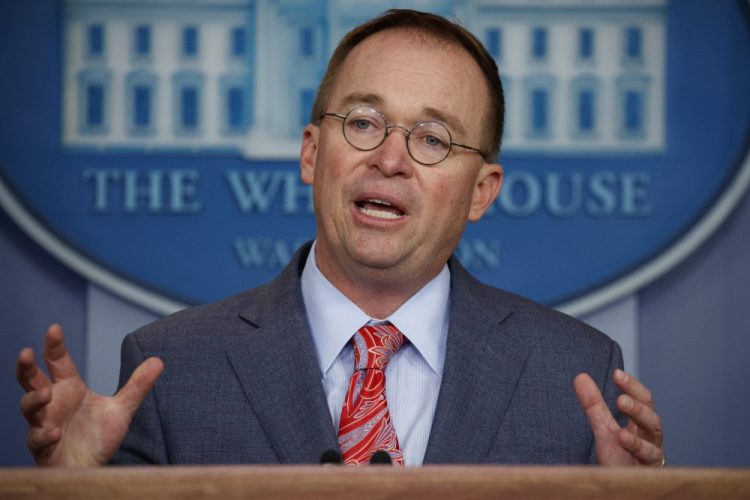An attorney for former national security adviser John Bolton and his deputy, Charles Kupperman, formally opposed acting White House chief of staff Mick Mulvaney’s last-minute effort to join a lawsuit asking the courts to decide if senior Trump administration officials must testify in Congress’ impeachment inquiry.
The Monday court filing underscored internal divisions among President Trump’s advisers in the probe, with Bolton and Kupperman said by people close to them to consider Mulvaney a key participant in Trump’s alleged effort to pressure the Ukrainian government to pursue investigations into his political opponents.
In an 11-page filing, Kupperman attorney Charles Cooper asked a judge to reject Mulvaney’s motion to join the lawsuit, instead suggesting the court hear it “in tandem” as a separate but related case.
Mulvaney went to court Friday seeking to join the separation-of-powers lawsuit filed against both Trump and the House leadership by Kupperman.
The latter has asked U.S. District Judge Richard Leon of Washington, D.C., to rule on whether Congress’ constitutional impeachment power takes precedence over the White House’s claim that current and former top executive branch aides are “absolutely immune” from being compelled to testify, as part of the president’s powers.
Bolton and Kupperman have said they are willing to testify if the judge rules in favor of the House, The Washington Post previously reported.
Mulvaney’s attempt to join the lawsuit flabbergasted Bolton and Kupperman, people close to them said, with Bolton aides having testified that he derisively referred to the Ukrainian proposal as “a drug deal,” and White House officials saying Bolton and Mulvaney were barely on speaking terms when Bolton left his post in September.
Cooper, who is also Bolton’s attorney, cited four reasons for keeping the cases separate. He argued that while Kupperman “is and will remain neutral” on whether Congress or the president is correct, “Mulvaney has made it clear that he supports the Executive;” and that Mulvaney is a current Trump adviser while Kupperman has left his post.
Kupperman’s duties also were exclusively related to advising on “highly sensitive matters of national security and foreign policy,” while Mulvaney’s were not, Cooper argued, writing, “If any close personal advisor to the President qualifies for testimonial immunity, it surely must be the President’s National Security Advisor and his deputy.”
Kupperman’s filing also stated that while he “has never publicly disclosed information relating to any of his official duties,” Mulvaney has commented publicly, appearing to admit and then deny a “quid pro quo” relationship between Trump’s decision to withhold U.S. security aid to Ukraine and a request that officials there investigate former vice president Joe Biden and his son, Hunter Biden.
“Accordingly, there is a serious question as to whether Mulvaney waived the absolute testimonial immunity claimed by the President,” Cooper argued.
In a separate House filing Monday to Leon, House General Counsel Douglas Letter also opposed Mulvaney’s motion to join the lawsuit, arguing that the case is moot because the House has withdrawn Kupperman’s October subpoena.
Mulvaney lacks legal “standing to challenge a now-withdrawn subpoena issued to somebody else,” Letter argued. Mulvaney also seeks different relief than Kupperman, of voiding a House subpoena, and names additional defendants, Letter wrote.
Mulvaney has not said that he would comply with the House’s order if the court rules against him, and the House has not withdrawn his subpoena.
“The Court should reject such gamesmanship and deny Mulvaney’s motion,” Letter said, particularly because as White House chief of staff, Mulvaney “likely played a role in the decision” to assert absolute immunity for himself.
Leon has set a 5 p.m. telephone scheduling conference in the case for resolving Mulvaney’s request. The judge previously set final arguments for Kupperman for Dec. 10. While the schedule and a quick ruling could potentially allow the case to be heard by a federal circuit court of appeals and even the U.S. Supreme Court next year, neither is likely to be able to act before the House has said it wishes to complete impeachment hearings, by year end.
Copy the Story Link
Send questions/comments to the editors.



Success. Please wait for the page to reload. If the page does not reload within 5 seconds, please refresh the page.
Enter your email and password to access comments.
Hi, to comment on stories you must . This profile is in addition to your subscription and website login.
Already have a commenting profile? .
Invalid username/password.
Please check your email to confirm and complete your registration.
Only subscribers are eligible to post comments. Please subscribe or login first for digital access. Here’s why.
Use the form below to reset your password. When you've submitted your account email, we will send an email with a reset code.